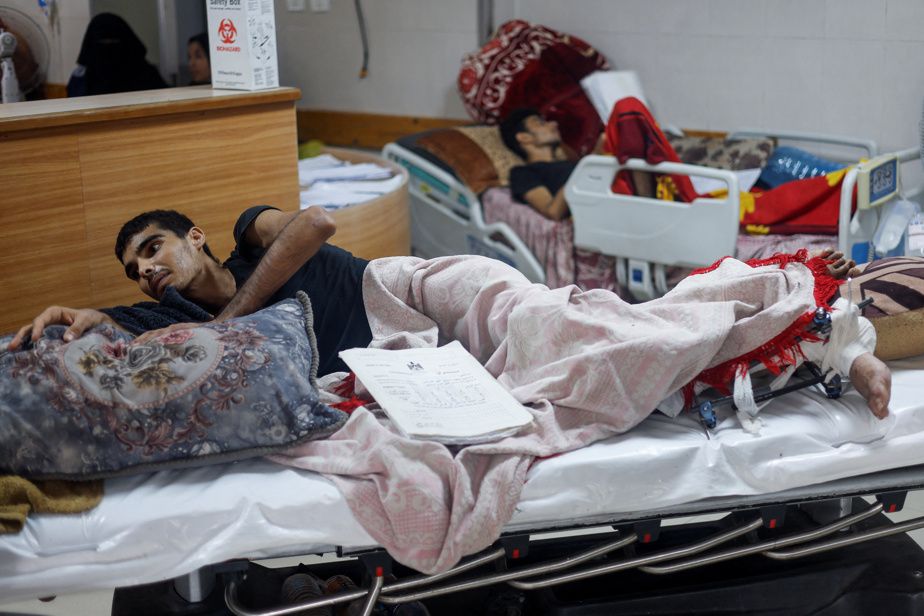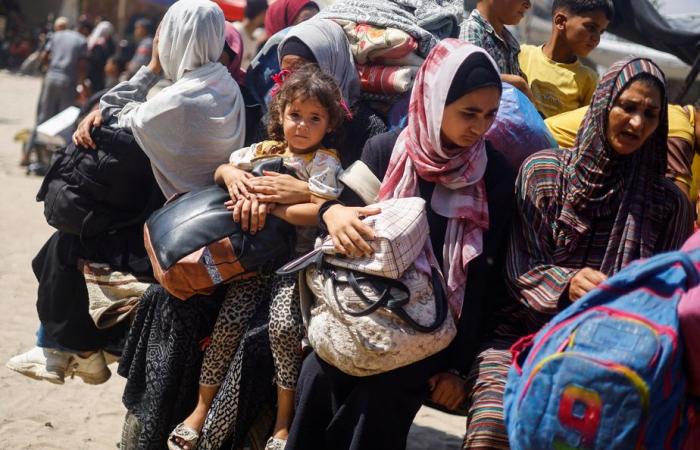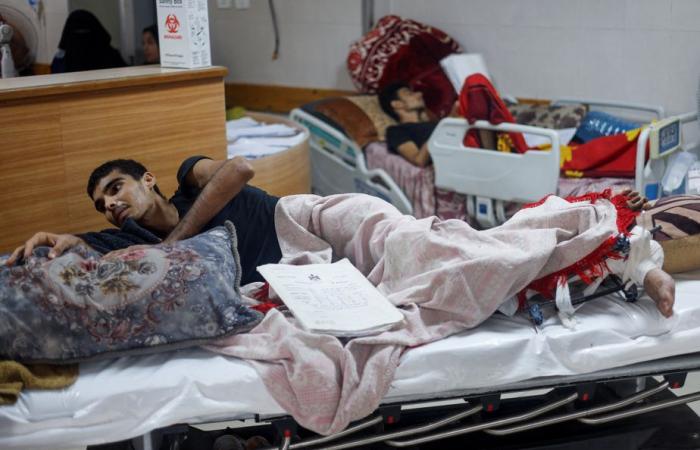Thousands of Palestinian families fled several areas of the southern Gaza Strip on Tuesday, once again forced onto the roads after evacuation orders from the Israeli army, while bombardments continued across the besieged territory.
Posted at 6:28 a.m.
Updated at 12:56 p.m.
Around 250,000 people, according to the UN, have been called to evacuate since Monday from areas east of Rafah and Khan Younis, forced to return in search of water, food and shelter across the territory devastated by nearly nine months of war between Israel and the Islamist movement Hamas.
On Tuesday, displaced families fled on foot or crammed into overloaded cars and trailers amid the dusty ruins of Khan Younis, the largest city in the south of the territory. Some had slept outside, not knowing where to go.
Airstrikes, according to witnesses, targeted the town, from which the Israeli army had withdrawn in early April after a months-long battle. Medical sources reported at least eight dead and about 30 wounded in the area.
“We didn’t know where to go and we don’t have enough money to buy a new tent,” said Ahmed al-Najjar, a 26-year-old man from Bani Suheila, one of the affected towns. “We had to spend the night on the streets and this increased our stress. This morning we decided to return home,” he added.
1.9 million displaced people
In total, 1.9 million people in the Gaza Strip are now displaced, according to the UN, or 80% of the population.
“More than a million people are once again displaced,” bringing the number of displaced people across Gaza to 1.9 million, the UN humanitarian coordinator for the territory, Sigrid Kaag, said on Tuesday, adding she was “deeply concerned” by the new evacuation orders.
PHOTO MOHAMMED SALEM, REUTERS
Palestinians flee Khan Younis.
The orders followed rocket attacks on Israel on Monday, claimed by Islamic Jihad, a Palestinian armed group allied with Hamas.
After launching a ground offensive on October 27 in the northern Gaza Strip, the army gradually moved south, ordering civilians to evacuate the areas it targeted.
On May 7, it launched a ground operation in Rafah, a town on the border with Egypt, then presented as the final stage of the war against Hamas, forcing a million Palestinians to flee, according to the UN.
But in recent weeks, fighting has intensified again in several regions that the army had said it controlled, particularly in the north of the territory.
The army said Tuesday it was continuing its operations in Shujaiya in the north, in the center of the Gaza Strip and in Rafah. It announced that it had eliminated “many terrorists” in Shujaiya, an eastern neighborhood of Gaza City, where it launched an operation on June 27 that forced between 60,000 and 80,000 people to flee, according to the UN.
The army also announced the death of two soldiers on Monday, bringing to 319 the number of soldiers killed since October 27 in the Gaza Strip.
“An abyss of suffering”
The war was triggered on October 7 by an unprecedented attack by Hamas commandos infiltrated into southern Israel from Gaza, which resulted in the deaths of 1,195 people, mostly civilians, according to an AFP tally based on official Israeli data.
Of the 251 people kidnapped during the attack, 116 are still being held hostage in Gaza, including 42 who have died, according to the army.
In response, the Israeli army launched an offensive in the Gaza Strip, which has so far killed 37,925 people, mostly civilians, according to data from the Health Ministry of the Hamas-led Gaza government.

PHOTO MOHAMMED SALEM, REUTERS
A patient on a stretcher at Nasser Hospital in Khan Younis.
Israeli Prime Minister Benjamin Netanyahu has vowed to destroy Hamas, which has ruled Gaza since 2007 and is considered a terrorist organisation by the United States, the European Union and Israel.
He reaffirmed on Tuesday that the war would end once all objectives were “achieved”, “including the destruction of Hamas and the release of all hostages”.
Reacting to anonymous statements, which he said were reported in the American newspaper New York Times, indicating that Israel would be ready to end the war without having achieved its objectives, Mr Netanyahu assured that this “would not happen”.
“We will not succumb to the sirens of defeatism,” he said, according to his office.
On Monday, he assured that “the end of the phase of eliminating the terrorist army of Hamas” was approaching.
The war has caused a humanitarian disaster in the small territory, where water and food are in short supply and aid, which is strictly controlled by the Israeli authorities, is arriving in insufficient quantities.
“Palestinian civilians in Gaza are in an abyss of suffering. Their lives are shattered,” Sigrid Kaag said Tuesday. “The war has not only created the deepest humanitarian crisis. It has unleashed a maelstrom of human misery,” the UN official added.
Israel says it has connected a desalination plant to its electricity grid
Israel, which is imposing a siege on the Gaza Strip, announced Tuesday that it had connected a desalination plant run by UNICEF in the south of the territory to its electricity grid.
“A new power line from Israel has been directly connected to a water desalination plant in Khan Younis,” said a statement from the Israeli army and Cogat, the Israeli Defense Ministry’s branch that oversees civilian activities in the Palestinian Territories.
“Once they repair the lines on the Gaza side, we think that within a week or two, it all depends on them, we will electrify this line,” said Colonel Elad Goren of Cogat during a press briefing.
In Khan Younis, fighting resumed between Hamas and Israel, which once again ordered the evacuation of residents.
PHOTO JEHAD ALSHRAFI, ARCHIVES ASSOCIATED PRESS
Palestinians displaced by Israeli bombardment of the Gaza Strip queue for water at a makeshift tent camp in Khan Younis.
“We still haven’t received electricity, but we are preparing for the possibility that they [Israël] “Activate the line,” a source within the electricity distribution company in Gaza told AFP on Monday evening, indicating that they were repairing the main power line in Khan Younis.
On Thursday, UNICEF said it had reached an agreement with Israel to restore electricity to the Khan Younis desalination plant.
“This is an important step and we look forward to seeing it come to fruition,” Jonathan Crickx, UNICEF spokesman in the Palestinian Territories, told AFP.
The need for drinking water is considerable in the Gaza Strip, ravaged by nearly nine months of war between the Israeli army and the ruling Hamas.
Following the Hamas attack on Israeli soil on October 7, Israeli Defense Minister Yoav Gallant announced on October 9 that he was imposing “a complete siege” on Gaza: “No electricity, no water, no gas.”
Since then, the humanitarian situation for the 2.4 million inhabitants has deteriorated considerably, according to NGOs on the ground.
“Currently, the (Khan Younis) plant produces only 5,000 cubic meters of water per day. Thanks to the new power line from Israel, the plant’s production will increase to 20,000 cubic meters of drinking water per day,” according to Israeli authorities.








